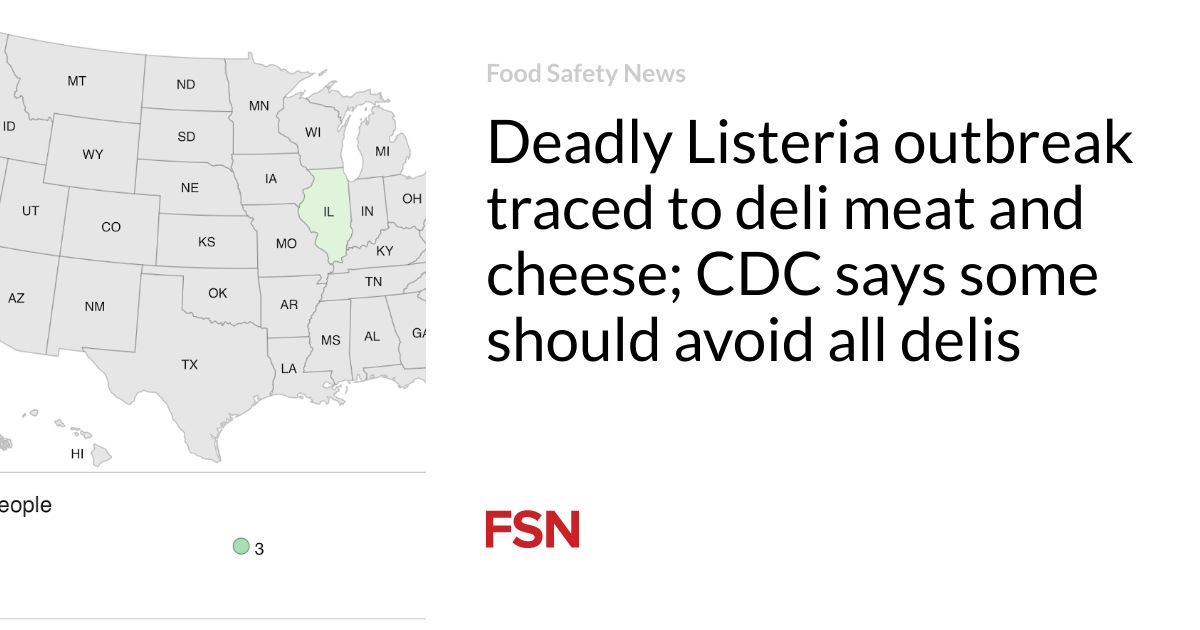The CDC is recommending that certain people not eat any meat or cheese from any deli counters because of a deadly outbreak of infections from Listeria.
The warning is mostly for people who are at high risk for infection, such as people 65 and older, pregnant women, or people with compromised immune systems.
So far the outbreak has sickened 16 people across six states. Thirteen people have required hospitalization and one has died. One of the sick people one was a pregnant woman with an infection resulting in the loss of a baby.
As of this afternoon, sick people range in age from 38 to 92 years old, with a median age of 74, and 62 percent are male. Of 13 people with ethnic information available, 11 are of Eastern European background or speak Russian. The sick people range from New York to California.
“Of the 12 people interviewed, 11 reported eating meat or cheese from deli counters. Among seven sick people in New York, five bought sliced deli meat or cheese from at least one location of NetCost Market, a grocery store chain that sells international foods,” the CDC reported.
However, sick people from other states purchased deli meats or cheeses from other delis.
“Investigators do not believe that NetCost Market delis are the only source of illnesses because some sick people in the outbreak did not shop at a NetCost Market. A contaminated food likely introduced the outbreak strain of Listeria into delis in multiple states,” according to the CDC.
The agency says it is difficult for investigators to identify a single food as the source of outbreaks linked to deli meats and cheeses. This is because Listeria spreads easily between food and the deli environment and can persist for a long time in deli display cases and on equipment. A contaminated food likely introduced the outbreak strain of Listeria into delis in multiple states. Investigators are working to identify any specific products or delis that may be contaminated with the outbreak strain.
Sick people’s samples were collected from April 17, 2021, to Sept. 29 this year. The CDC reports that the true number of sick people in this outbreak is likely higher than the number reported, and the outbreak may not be limited to the states with known illnesses. It can take up to 70 days for symptoms of Listeria infection to appear, making it difficult to diagnose and find the source of the pathogen.
Also, some people recover without medical care and are not tested for Listeria.
Whole genome sequencing — genetic fingerprinting — showed that bacteria from sick people’s samples are closely related genetically. This suggests that people in this outbreak got sick from the same food.
In 2021, health officials in New York state and New York City found the outbreak strain of Listeria in several environmental and food samples:
- Environmental samples from a NetCost Market deli in Brooklyn
- Several open packages of mortadella and ham were sliced at the same NetCost Market deli in Brooklyn
- Sliced salami that a sick person bought from a NetCost Market deli in Staten Island
NetCost Market voluntarily closed the deli temporarily in Brooklyn after notified them about the sampling results. NetCost Market performed a deep cleaning and then reopened the deli in Brooklyn after further environmental testing did not identify Listeria.
In September 2022, the outbreak strain was found at the same Brooklyn NetCost Market deli; however, the most recent illness with NetCost Market exposure was in October 2021. After a deep cleaning, additional environmental testing did not identify Listeria in the deli.
About Listeria infections
Food contaminated with Listeria monocytogenes may not look or smell spoiled but can still cause serious and sometimes life-threatening infections. Anyone who has developed symptoms of Listeria infection should seek medical treatment and tell their doctors about the possible Listeria exposure.
Also, it can take up to 70 days after exposure to Listeria for symptoms of listeriosis to develop.
Symptoms of Listeria infection can include vomiting, nausea, persistent fever, muscle aches, severe headache, and neck stiffness. Specific laboratory tests are required to diagnose Listeria infections, which can mimic other illnesses.
Pregnant women, the elderly, young children, and people such as cancer patients who have weakened immune systems are particularly at risk of serious illnesses, life-threatening infections, and other complications. Although infected pregnant women may experience only mild, flu-like symptoms, their infections can lead to premature delivery, infection of the newborn, or even stillbirth.
(To sign up for a free subscription to Food Safety News, click here)

